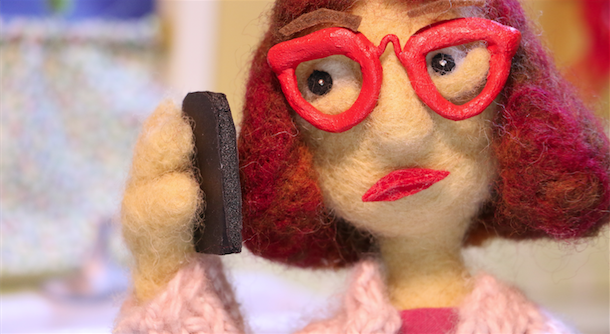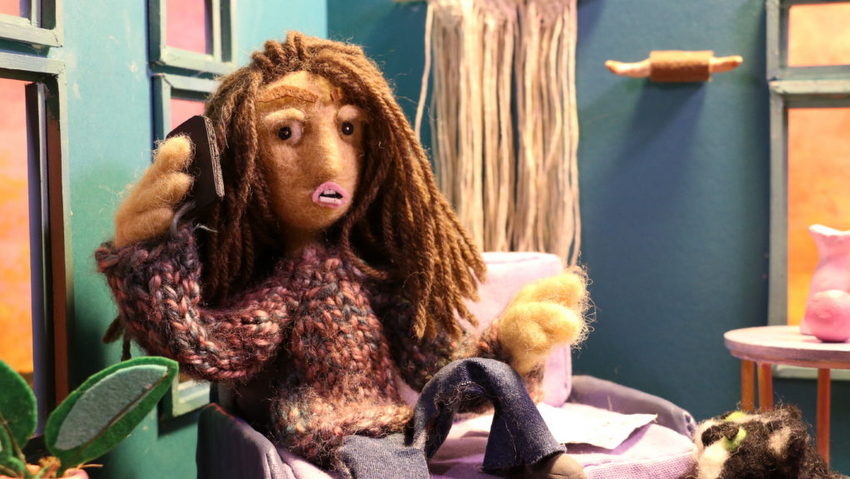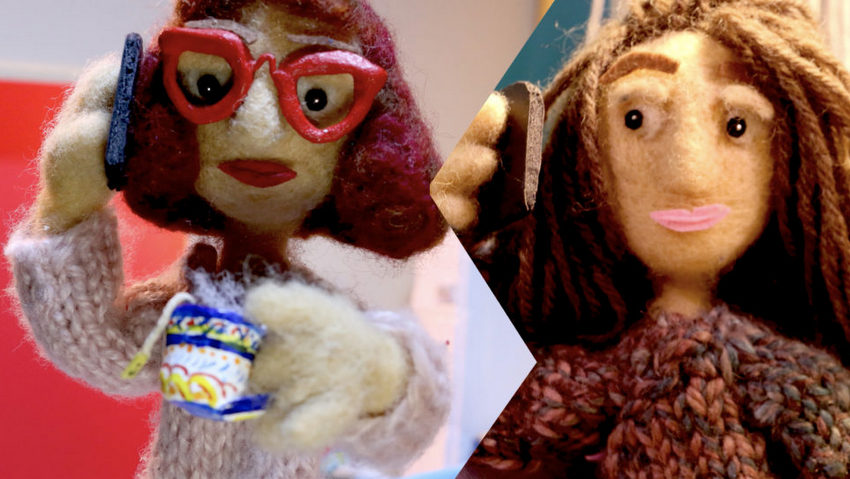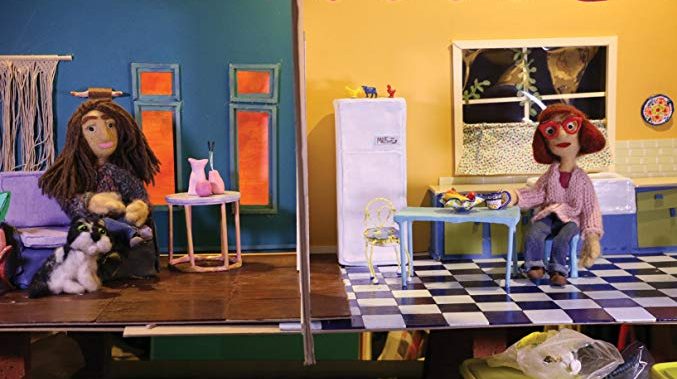
Elizabeth Hogenson ’s animation Dani shares a tale of a former roommate’s call with her mum, about a threatening illness. Dani won the Grand Jury Prize for Best Animated Short at Mammoth Lakes Film Festival 2019, has screened at American Documentary Film Festival and Film Fund 2019. Dani is screened at the Oscar Qualifying Film Festival Palm Springs International ShortFest. Elizabeth walks you through the process that made her short film.
Having cancer isn’t always the hard part. On top of managing your own fears and expectations, you feel obliged to wear a brave face for your loved ones. Dani brings such a conversation to life, as 30-year old Danielle delivers her grim breast cancer prognosis to her mother.
A story that’s as unique and personal as it is disturbingly universal. Using stop-motion animation, Dani shows us how a simple phone call can be a study of human courage, faith, and love.
indieactivity : Give a background of your personal experience with the story, writing, production and marketing?
Elizabeth Hogenson : The phone call featured in “Dani” is a real call. The subject, Danielle Hernandez, was diagnosed with stage 4 breast cancer at the age of 30. As a coping mechanism, Danielle started a podcast about her experiences with her diagnosis and treatment. The call featured in “Dani” was recorded as part of the podcast, where she needed to share with her mother some less than great news about the progress of her treatment.
I was roommates with Danielle at the time of her diagnosis, so I was closely following her progress. The moment I heard the call, I was so affected, I knew I had to do something with it.

indieactivity : Did you start writing with a cast (You or any) in mind?
Elizabeth Hogenson : The actual call about 20 minutes long, and has on it Danielle’s mother, Violetta, and her two best friends for college. For the “Dani” short, I edited the call down to about 8 minutes, and focused it in to just the conversation between Danielle and her mother. I wanted to bring focus to the narrative, to really drive home what I found as the emotional core.
indieactivity : How long did you take to complete the script? (Do you have a writing process?)
Elizabeth Hogenson : Since this wasn’t a traditional script, the process of editing the call and deciding on the final record took about two months. The reason it had to be absolutely perfect was, because the film is stop motion, I had to plan each second, every single little transition and moment, before beginning the animating process. So, after coming up with the first passthrough of the call, I allowed myself some time to reflect, meditate, and really perfect the timing.
Related Story : Award-Winning Animation Dani Shares Intimate Family Conversation About a Life Changing Illness
indieactivity : When did you form your production company – and what was the original motivation for its formation?
Elizabeth Hogenson : The production company is really just me. I’ve turned a closet in to my animation studio space.
indieactivity : What was the first project out of the gate?
Elizabeth Hogenson : This (Dani) is my first project.
indieactivity : During production, what scene (that made the cut) was the hardest to shoot?
Elizabeth Hogenson : There’s sort of an emotional climax with Violetta, where she’s crying and she gets up from the table (the puppet of Violetta, that is). I probably shot the animation for that sequence about 3 time before I was happy with it. As the animator, your shaping the performance. It’s such an emotional moment that it really needed to be perfect to deliver the emotions.

indieactivity : What works better in this latest production that mightn’t have worked so well in the last one you did?
Elizabeth Hogenson : This is my first production, so it’s all a learning process.
indieactivity : You produced and directed the film, what measure of input did it take to don these hats?
Elizabeth Hogenson : Most of the production was just me, standing around, working with my puppets. It can get frustrating and a little isolating at times. You can easily lose perspective. It’s important to find ways to focus yourself, but also know when you need to step back, and objectively evaluate your process.
indieactivity : Is there anything about the independent filmmaking business you still struggle with?
Elizabeth Hogenson : Making sure you have the resources and motivation to start your next project. I’ve been doing interviews and trying to line up a time to film my next project, but when it all rests on you, it can often feel daunting. You really have to believe in yourself and be your own biggest cheerleader.
indieactivity : Where do you think your strengths lie as a filmmaker?
Elizabeth Hogenson : My dedication to completing a project.
indieactivity : Let’s talk finance, How did you finance the film?
Elizabeth Hogenson : I received a small grant from a foundation at the University of Southern California called the Bridge Arts and Science Alliance, which seeks to “bridge” the gaps between arts and sciences. Every year, the fund a few projects that have a commitment to accurately representing science through an artistic means. I worked with a post-grad from the foundation on ensuring that the representations of science, in the case of my film, related to cancer and treatment, were scientifically accurate.
indieactivity : How much did you go over budget? How did you manage it Elizabeth Hogenson : I somehow stayed in budget! You don’t always get what you want, so sometimes you have to come up with creative solutions to problems or compromise. I used to work in finance, so I really understanding the importance of realistically budgeting.
indieactivity : How important is marketing? Do you think a project can make any dent without it these days?
Elizabeth Hogenson : Whether it’s self-promotion on you social media, or working with news outlets, marketing is everything. It took me awhile to be comfortable with promoting myself and my work, but it’s the only way anyone is going to see it.
indieactivity : Can you tell us about your marketing activities on the project – and how it’s gone for you?
Elizabeth Hogenson : I’ve only really started dipping my toes in marketing, but I’m enjoying the process. I think that “Dani” is such an important film, that I honestly enjoy any opportunity where I can share it with others.

indieactivity : What do you hope audiences get from your film?
Elizabeth Hogenson : I hope that they’re moved. I hope that it spurs them to reach out to someone in their life and check-in on them. In the end of the day, all we have are the connections and love we share with others. It’s the most valuable thing.
indieactivity : What else have you got in the works?
Elizabeth Hogenson : I’m currently working on putting together a short documentary about Alzheimer’s and income inequality. It will incorporate interviews with patients and experts in the field, and will also feature stop motion animated sequences. Ageing can be difficult to talk about, and we often overlook some of the unpleasant aspects of it. I don’t think things need to be that way.
Follow Elizabeth Hogenson on Social Media
IMDb
Instagram
LinkedIn
Vimeo
Hello Stranger by Paul Raschid set for London Games Festival & BIFFF
The film Is set for an April 10th Premiere at The Genesis Cinema in London (LGF) and BIFFF
Daydreamers Official Trailer by Timothy Linh Bui: Released by Dark Star Pictures
Daydreamers Vietnamese Vampire Thriller – May 2nd release
Afternooner by The Harrow Brothers: Funniest Movie of the Decade on VOD & DVD April
Freestyle Acquires “Afternooner” for April Release
Where We Stay by Florence Bouvy to Screen at CIFF
Where We Stay | CIFF Selected Drama About Friends Hiding Unspoken Truths
This Place by V.T. Nayani: Two Women in Love for the First Time on VOD & DVD March 25
Freestyle Acquires “This Place” for March Release
Sonoma International Film Festival Wraps with Unforgettable Films, Culinary Cinema and Packed Pop-In Events
Sonoma International Film Festival Grand Jury and Audience Award Films Announced
Livestreams with Grandmapuzzles by Emily Sheskin to Screen at CIFF
CIFF Selected Documentary About Twitch Streaming Jigsaw Puzzler









